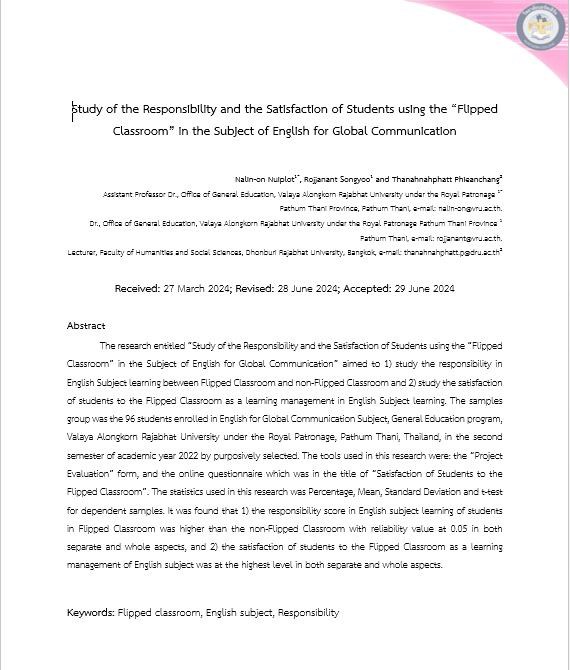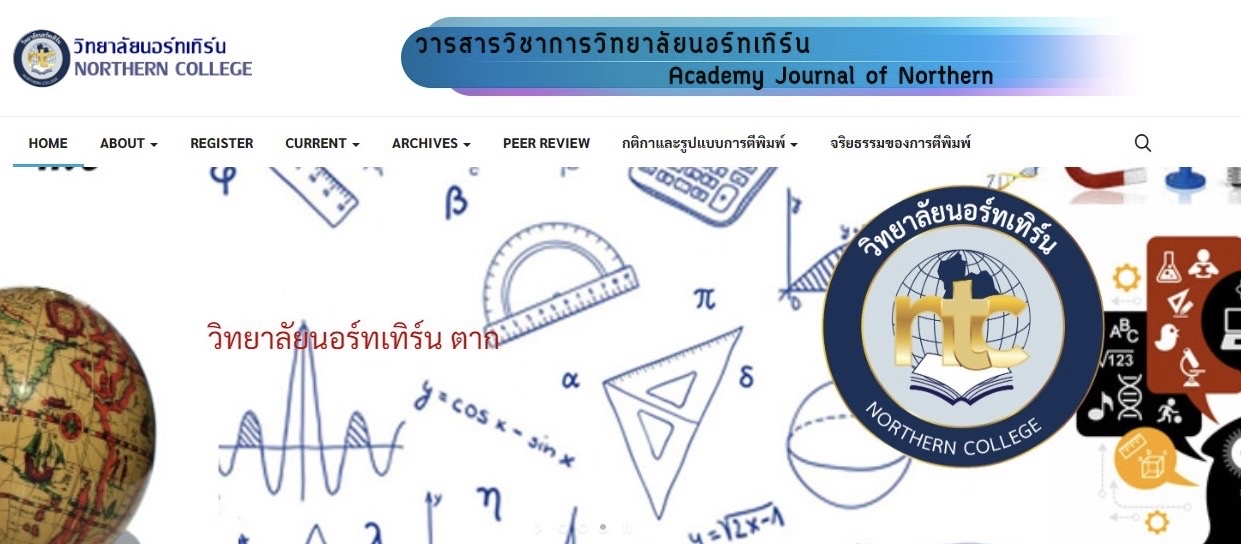Study of the Responsibility and the Satisfaction of Students using the “Flipped Classroom” in the Subject of English for Global Communication
บทคัดย่อ
The research entitled “Study of the Responsibility and the Satisfaction of Students using the “Flipped Classroom” in the Subject of English for Global Communication” aimed to 1) study the responsibility in English Subject learning between Flipped Classroom and non-Flipped Classroom and 2) study the satisfaction of students to the Flipped Classroom as a learning management in English Subject learning. The samples group was the 96 students enrolled in English for Global Communication Subject, General Education program, Valaya Alongkorn Rajabhat University under the Royal Patronage, Pathum Thani, Thailand, in the second semester of academic year 2022 by purposively selected. The tools used in this research were: the “Project Evaluation” form, and the online questionnaire which was in the title of “Satisfaction of Students to the Flipped Classroom”. The statistics used in this research was Percentage, Mean, Standard Deviation and t-test for dependent samples. It was found that 1) the responsibility score in English subject learning of students in Flipped Classroom was higher than the non-Flipped Classroom with reliability value at 0.05 in both separate and whole aspects, and 2) the satisfaction of students to the Flipped Classroom as a learning management of English subject was at the highest level in both separate and whole aspects.
เอกสารอ้างอิง
Academic Bureau. (2014). Conclusion of the workshop on “Practices Handbook in Good Teaching and Techniques in Higher Education” Ubonratchathani: Academic Bureau of Ratchathani University.
Aranya Choksawat (2007). The management of science learning based on projects to improve the analytical thinking of students in Ban Pan School, Level 2. Thesis of Master of Education, Major of Science Education: Khon Kaen University.
Atchara Chaiwiwat. (2008). Curriculum Development of Critical Thinking Skills for Students in Prathomsuksa 6 of Basic Education. Journal of Education. 19, 3. 65-78 pp.
Clyde Freeman Herreid & Nancy A. Schiller. (2013). Case Studies and the Flipped Classroom. Journal of College Science Teaching, 42, 5. 62-66 pp.
Kathleen Fulton. (2012). Upside Down and Inside Out; Flip Your Classroom to Improve Student Learning. Learning & Leading with Technology, 39, 8. 12-17 pp.
Ladda Silanoi & Angkana Tungkasamit. (2010). Training materials on “The Development of Project-based Learning”. Khonkaen: Faculty of Education, Khonkaen University.
Nalin-on Nuiplot. (2016). “Enhancing in Critical Thinking Skill of Students by Project-Based Learning in GE103 Module : Innovation and Scientific Thinking”, article in the Proceeding book of “The 2nd National Conference on General Education”, 23-24 June 2016 at Golden Tulip Sovereign Hotel, Bangkok.
Office of the National Primary Education Commission. 1998. Learning to Life Skills (1st edition). Bangkok: Kurusapa Printing Ladphrao.
Porntipa Sriwong (2009). Learning outcomes in the subject of Health Education and Physical Education, Mathayomsuksa 3 students using the project-based learning model. Thesis of Master of Education, Major of Curriculum and Instruction: Khon Kaen University.
Saeng-roong Poonsuwan. (2013). Improving the Thinking Skills of Students in the 21st Century. School in Focus magazine. 5, 13. 6-7 pp.
Wilaiporn Promsri (2008). Results of learning activities in Science Learning in theme of Species of life, Prathomsuksa 5 students using project-based teaching. Thesis of Master of Education, Major of Curriculum and Instruction: Khon Kaen University.
Robert Maier. (2019). Self-Responsibility: Transformations. American Behavioral Scientist: Vol. 63(1). 27-32.
Sittipol Art-in & Theerachai Nate-tanomsak (2011). Project-based learning management in curriculum development for undergraduate students, 5-year courses. KKU Research Journal, 1, 1. 1-16 pp.
Suthini Rattanasri. (2008). The Development of English Communication Achievement for Communication of Mathayom Suksa 5 Students using Project-Based Teaching. Thesis of Master of Education, Major of Curriculum and Instruction: Khon Kaen University.

ดาวน์โหลด
เผยแพร่แล้ว
รูปแบบการอ้างอิง
ฉบับ
ประเภทบทความ
สัญญาอนุญาต

อนุญาตภายใต้เงื่อนไข Creative Commons Attribution-NonCommercial-NoDerivatives 4.0 International License.






